
David Biggs
I try to always keep an open mind and my wits about me. Other than that, anything goes! Makes for some unpredictable adventures out there in the real world. I've worked in the publishing industry for 10+ years and have been a member of the FSWA for 5+ years. Go Steelers!
Website URL: http://www.drinkfive.com
Fantasy Football Podcast - 6/2/15 - AFC North & Jess's Birthday!
On this week's fantasy football podcast we broken down all of the teams in the AFC North. Some have gone through some major changes, while others remain largely unchanged. How will off-season moves affect players' fantasy values for the 2015 season? Tune in and find out our thoughts on just that!
(Listen to the Fantasy Football Podcast: 6/2/15, AFC North & Jess's Birthday!)
It's still the off-season, but we're really looking forward to kicking off the 2015 season with some draft shows - getting specific with strategies and honest advice on who the top performers at each position will be (and who will bust!). Subscribe to our podcast on iTunes to get notifications whenever we release a new episode. We also broadcast the shows live at http://www.mixlr.com/drinkfive on Tuesday nights at 9pm CT. Feel free to browse over and join in the discussion!
Welcome to the TV Soup podcast, home of drinkfive.com’s television review series. In this episode we share our thoughts about the season finale, "Daredevil". Since the show has already been renewed for another season, we're already looking forward to new episodes! A great finale, there are still quite a few questions that remain unanswered and leave the viewer wanting more. Check out the podcast to hear exactly what we thought about it!
TV Soup Podcast: Daredevil, "Daredevil" Review
As this is the season finale, we've finished season 1 of Daredevil and will be moving on to discuss another TV show going forward. At the moment, we're undecided - should you have any ideas for shows that you'd like us to discuss on this weekly podcast, please shoot an email over to This email address is being protected from spambots. You need JavaScript enabled to view it. or This email address is being protected from spambots. You need JavaScript enabled to view it. and let us know your thoughts!
TV Review: Netflix's Daredevil S01E11-12, "The Path of the Righteous" and "The Ones We Leave Behind"
Daredevil S01E11 – “The Path of the Righteous”
Fight or Flight
Wilson Fisk barges into the hospital with Vanessa, who has been poisoned by something in the drinks that were offered at the benefit they were attending. Immediately, he tries to get his way and get Vanessa immediate care. “Don’t you know who I am?” asks Fisk to a young woman working in the hospital when she refuses him entrance to the room that they take her into - “doesn’t matter,” she says, “fill out the paperwork.”
What will happen if Fisk loses his newfound love? Wilson Fisk without Vanessa at this point – especially if she was taken from him in this way – would likely send him into a chaotic freefall, even more out-of-control than he currently is.
“There was a time when I believed that I was complete – that I needed no one to understand who I am”. “If she dies..” Fisk suggests that Vanessa be sent away if she recovers so that she doesn’t have to be in danger any longer by staying at his side.
Battered and Bruised
Karen finds Matt still visibly hurt and thinks he may not be telling the truth about being in a car accident. It’s pretty amazing that for all of this time she doesn’t seem to have caught on to Matt’s after-hours escapades but, of course, she is dealing with a number of her own issues at the moment.
TV Soup Podcast: Daredevil, "The Path of the Righteous" & "The Ones We Leave Behind" Review
Both Claire and Karen are telling Matt to be more careful – his injuries are showing more and more and it’s becoming more difficult to hide his nightly exploits from the people that he associates with during the day. He doesn’t have to hide them any longer from Foggy, but Foggy doesn’t want anything to do with him for the time being. I suppose Karen will eventually find out if she continues to spend a great deal of time with Matt, but I don’t think it will be anytime soon.
A Turning Point
“Fisk killed his father, people need to know that”. Karen tries to get Ben to write up the story – Ben is still upset that Karen was lying to him when she brought him to the home on false pretenses. Ben says that Fisk can simply spin this like anything else. Good point.
Karen appeals to Ben’s morals and he lets her know that someone may have poisoned the drinks at the benefit – and that perhaps there are already people that are going after Fisk and his people (the news of this is currently being covered up).
Karen really does appreciate the people in her life that care about her and are worried/concerned with her well-being. She’s starting to develop a good relationship with Ben. She is abducted at the end of the evening by Wesley.
Wesley spends a long time talking to Karen about Fisk’s mother and her visit. “If you’re going to kill me, just do it,“ Karen says. “I’m not here to kill you, Ms. Page, I’m here to offer you a job.”
Wesley wants Karen to convince Ben that Fisk is a good man and that he should no longer be trying to find faults in him and his character. He suggests that if she doesn’t comply, he will slowly kill everyone that she cares about before coming after her.
Karen is able to take a moment of distraction (Fisk calling) to grab the gun from the table and shoot Wesley. He had unloaded the first chamber of the gun, but the rest of the bullets were just where they needed to be. Bye, Wesley.
Wesley knows that Ben was there as well, which doesn’t bode well for him in the short term.
It’s Personal
Karen is still trying to get the word out about Fisk’s mother, but Foggy is of the same opinion as Ben was – “it won’t be enough”.
Foggy wants to talk to Karen about what he found out about Matt but he is still keeping his mouth shut out of the remaining respect he has left for his old friend. “It’s personal,” is all he’ll say.
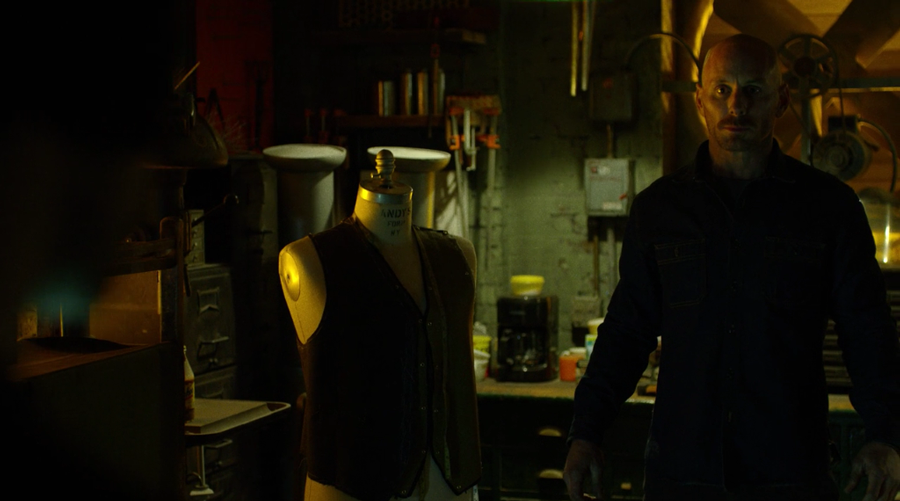 Angels & Demons
Angels & Demons
On one of his many visits to talk to the priest, Matt has an intense conversation about good and evil. Maybe devils were created as a warning to us all – to tread the path of the righteous. The priest basically admits to knowing that Matt is the masked man – I’m not sure that Matt can trust the priest, but then we don’t know very much information about him and his history.
One would think that someone as careful as Matt would have thought all of these things through, but then again he often just bursts onto a scene without giving the situation enough thought beforehand. The priest has basically given Matt his name and purpose here.
Becoming Daredevil
Matt finds out more about Fisk’s body armor – he’ll need to figure out a way past it if he is to finally be rid of Fisk. Turns out the source of this armor was a man named Melvin Potter, who is not very intelligent but is possessing of a huge amount of strength and endurance.
Melvin is being made to work for Fisk – he is afraid that if he doesn’t do what Fisk says, ‘Betsy’ will be hurt. Betsy is someone that Melvin cares about. Matt talks Melvin into making him something.. “a symbol” out of the armor that he works with. Looks like we’re talking about a new, upgraded costume! Thank goodness for that, because Matt likely would not have lasted much longer getting his ass kicked at least once per episode.
Daredevil S01E12 – “The Ones We Leave Behind”
Reconsideration
Fisk shows up at Karen’s house - he has quite an imposing presence. He says, “It gets easier” (referring to Wesley’s death by her hand), “the more you do it”. Thankfully, she wakes up – it was just a nightmare. All of this is weighing on Karen quite heavily.
Karen and Foggy have a conversation at the office and Foggy reassures Karen that “everything is going to be alright” The mood turns decidedly more sour when Foggy turns to leave and finds Matt at the door.
Everyone is slowly leaving Matt’s side – Karen says “You know, I’m starting to feel like I made a mistake” [about coming to work at Nelson v. Murdock]. She is not leaving yet, however.
Later on.. “Matt.. is this what we are now? 3 People that don’t even talk to each other?” asks Karen.. this starts a conversation where Matt breaks down to Karen – he needs the support of his friends, he can’t go on alone as he has been and keeps burning bridges and keeping secrets from everyone. Although he doesn’t reveal his identity to Karen, this is a step in that direction.
Complications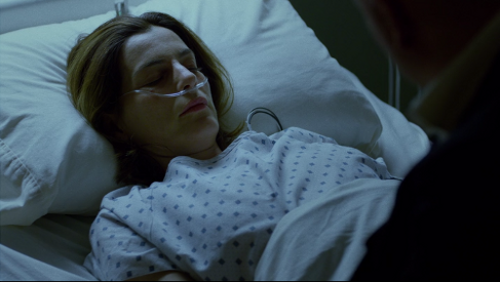
Vanessa wakes up in her hospital bed - “why am I here,” she asks. Fisk explains that he has made arrangements for her to be taken out of the country, but she does not want to go along with those plans. “I knew being with you would be.. complicated.” She says. “Find whoever did this to us and make them understand.” “I’ll make them suffer for what they’ve done,” retorts Fisk. “I expect nothing less,” says Vanessa. These two are just made for each other.
Fisk finds out that Wesley was shot after his people located the body in the warehouse where he had brought Karen. In a fit of rage he beats one of his own men, just for following Wesley’s orders.
Fisk’s people are all beginning to blame the Japanese for the problems that they are coming up against recently (poisoned drinks, Wesley’s death). Fisk finds Wesley’s cellphone and realizes that the last call he made (the one that made him leave suddenly and resulted in his death) was to Fisk’s mother. Karen and Ben are still not safe.
Bach's Violin concerto No. 1 in A minor
Matt and Ben want to slow down Fisk’s takeover of the city so they’d like to cut off the main supply of money. Ben knows that a blind Chinese man is usually carrying the drugs around in a pack, so (using Ben’s information) Matt tracks the man into a car (playing classical music) as they drive through the city. It’s quite an impressive jaunt across the rooftops, really.
Now inside the building where the blind man was headed to, Matt witnesses the drug packing enterprise here firsthand. All of the workers have been blinded.
“All those people – you took their eyes,” accuses Matt of Madame Gao when they finally meet. “No, they blinded themselves,” she says. Madame Gao engages in a confrontation with Matt, knocking him out for a short time with what seems like very little physical force and managing to get away. Trying to get away himself, Matt gets in an altercation with a police officer where he attempts to explain that he is not deserving of the bad rap he is currently getting. Good luck with that, Matt.
Old Flames
Foggy allows Marci to see all of the information that they have gathered so far on Fisk (including the material handed over by the masked man (who Foggy now knows is Matt). Marci’s firm represents Fisk, but she seems genuinely interested in what Foggy has to show her.
Will she help or hurt them in the long run? It seems like Foggy and Marci had a trusting relationship and are starting it back up. Hopefully Marci won’t be stabbing Foggy in the back literally or figuratively – he’s such a genuinely nice guy.
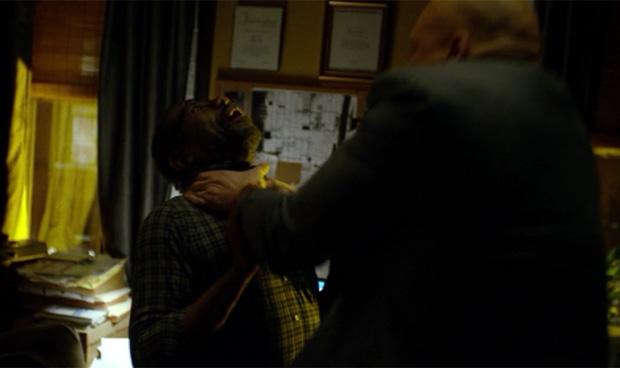 The Long Farewell
The Long Farewell
Ben is desperately trying to get the editor of the paper to publish his latest story about Fisk killing his own father, etc but is not having any luck at all. He pushes so much that he gets suspended, and then eventually fired after accusing his boss of being on Fisk’s payroll.
Regardless of Ben’s situation with the newspaper, his wife will always be behind him 100% and suggests that he just try other news outlets in order to get the story out. The internet, etc. It looks like this story has legs and he is not going to give up on it anytime soon.
“I’m going to write about all of it. Tonight. Get it out there,” Ben says.
As Ben sits down to begin work on his new project, Fisk begins talking to him from the shadows. He explains that he had taken precautions after the Union Allied article was released and he also had found out that Ben went to talk to his mother. “I’m not here to threaten you,” he says at one point – “I’m here to kill you.” It’s unfortunate that we’ve grown to like Ben so much as a character of principle with a good heart, but those are the best characters to kill off in a series like this – it makes the most emotional impact and reinforces just how dark the heart of our villain, Wilson Fisk, can be.
Although viewers are certainly looking around on-screen for Matt, or anyone else to come to his aid at the last moment – Ben is killed in cold blood by Wilson Fisk, and his words will die with him.
Who is Madame Gao?
Looks like Gao and Owlsley have been working together the whole time, and are trying to get Vanessa away from Fisk. They were behind the whole poisoned drink thing. They’re having serious trouble getting rid of Fisk’s girlfriend. “Yeah, she’s a real mule,” says Owlsley.
When Owlsley asks where Gao is going, she says that “I will visit my homeland and reflect upon the future.” Pressed as to where that exactly is.. China, maybe? She retorts, “It is a considerable distance farther.” Is she an alien? Referring to another world outside of the Earth? I’m just loving this supernatural intrigue – we know what types of things exist in the Marvel Cinematic Universe but haven’t seen much of that yet in season 1 of Daredevil.
 Developing the Science
Developing the Science
Cloning seems like something right out of a science fiction novel, or movie – and while it most certainly is, the practice has been around for thousands of years already. We weren’t cloning sheep, or humans that far back though – we were cloning plants from cuttings.
As the rapid pace of technology accelerated, more and more experiments took place within the scientific community to clone actual animal life. One of the first successful experiments was by Briggs and King in 1952 and resulted in the cloning of frogs.
They did this via nuclear transfer. It sounds incredibly difficult but it’s actually a very fundamental and simple process: first, the nucleus of an egg is removed and then the nucleus of a donor cell is implanted in its place. When the egg starts to divide, new copies of the older donor cell are produced – resulting in a perfect genetic copy of the original but going through the aging process from the beginning.
In the Spotlight
A little less than 30 years later, two interesting things happened within the span of 2 years: first, David Rorvik (an American Journalist) released a book called “In his Image: The Cloning of a Man” in 1978. The book claimed to follow the development of the first successful human clone and it sparked a huge amount of ethical debate in scientific and public forums alike. Ultimately, most thought the book to be a hoax, but nothing was ever proven one way or the other. The important thing that came from the book was the idea in the public’s mind that cloning of mammals (including humans) was just around the corner, if not possible at the time.
(Retrospectical Podcast Ep. 12 - Are Human Clones an Eventuality?)
The second thing was in 1980, the U.S. Supreme Court ruled that live, human-made organisms are patentable material. They later clarified their ruling.. in 2013 The Supreme Court issued a ruling that banned the patenting of naturally occurring genes but allowed edited or artificially created DNA to be patented. Companies were already starting to monetize our DNA and/or man-made synthetic DNA over 30 years ago! It makes it quite difficult to image what these same (and similar) companies are up to now - and unfortunately a lot of this development is happening behind the closed doors of private businesses rather than transparently.
Human Cloning
Benefits
- Growing new cells for replacement (although this could cause a divide – will people with more means be able to live longer via replacement organs, etc long before we unwashed masses have the technology available to us?)
- Cloning humans with the same genetic makeup in order to act as donors where the organs would not so easily be rejected
- Allowing couples that are unable to have children to reproduce and create their own genetic offspring.
Negatives
- Compromising individuality (how would we treat clones of an original donor? Would they have the same rights and privileges, or be looked upon as lesser citizens of the world? How would they treat themselves?)
- Decline of genetic variation (genetic diversity is one of the things that has allowed animals and humans to survive as long as we have – it fosters adaptation and prevents widespread diseases from wiping out entire species)
- A black market of fetuses, body parts and internal organs (since this is already happening, is it simply an eventuality once the technology gets to the level of cloning at a high-level of success? How would we prevent people from taking the technology into their own hands? Should we?)
- Current low level of fertility (Dolly, the famous sheep that was cloned in 1996, took 277 eggs to produce – 30 initially started to divide, 9 actually induced pregnancy and only one survived to term).
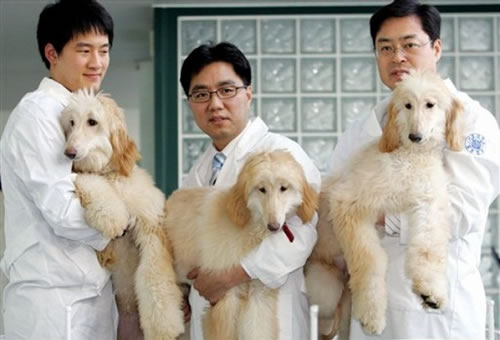 Little Nicky
Little Nicky
Pet cloning is already here.. cat or dog get run over by a car? If you have the money, you can already have a genetic copy of your dead pet created. One lab says “we have never failed in cloning a specific dog regardless of its size or breed”. There are currently orders and a waiting list. They cost $100,000.
Cloned Food?
While currently not available for public consumption, meat, eggs and milk from cloned animals were recently declared safe by the FDA, a preliminary decision that came after some five years of deliberation. The FDA has yet to decide whether products originating from cloned animals and from their offspring should be labeled as such.
Benefits of Cloned Food
The main benefit of food products originating from cloned animals is that it allows the food industry to have a greater control over the quality and quantity of foods produced. For example, ranchers can perpetuate their best livestock, resulting in a higher production of milk and eggs, as well as tastier meat. A study deemed that the safest animals to clone were cows, followed by pig, goat and sheep.
Side Effects of Cloned Food
While studies have found that young cloned animals are vulnerable to respiratory and cardiovascular problems, some experts believe that the risk to food safety of cloned animals is small. Studies in Japan have also not found any irregularities in cloned animals used for human consumption. However, a recent survey conducted in the United States found that some 60% of its participants had an aversion to consuming cloned food because of ethical reasons
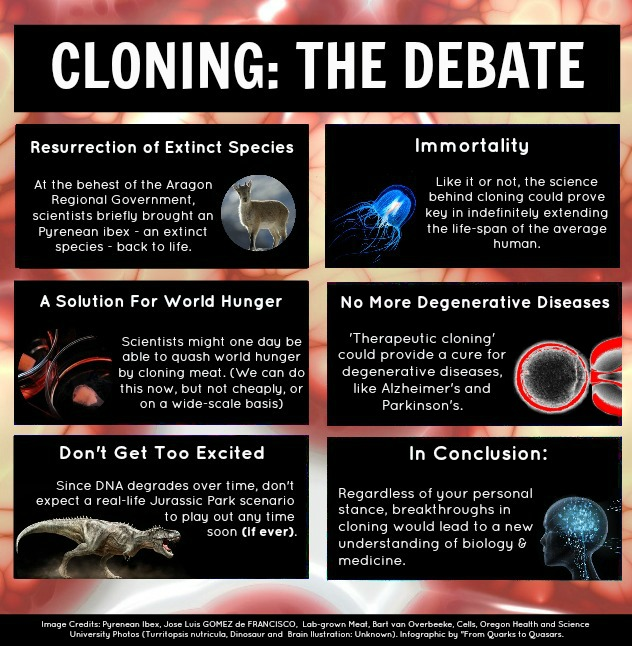
A Forced Future
In 2005, the United Nations General Assembly brought forth a Declaration on Human Cloning (http://www.un.org/News/Press/docs/2005/ga10333.doc.htm) which bans therapeutic cloning (where cells are cloned for therapy of a disease or condition) and reproductive cloning (creating a living genetic duplicate duplicate).
Assuming that our friend David Rorvik was a fraud and did not actually witness the first human cloning experiments back when Mork and Minday was an exciting new TV series, no one has yet come forward with evidence of an actual, viable cloned human having been created. But we do know that it is possible - some notable animals that have already successfully been cloned are: Cats, Cattle, Deer, Dogs, Frogs, Goats, Horses, Mice, Pigs, Rabbits, Sheep and Wolves. We have also successfully created human embryos but they were never allowed to survive past the blastocyst stage (5-10 days after conception).
Scary right? So it’s illegal, but that doesn’t usually stop people from doing things anyway. Science marches on. Do you think that there are currently scientists experimenting and creating viable embryos that last beyond the blastocyst stage? Do you think that there have already been cloned humans and that we are just not on the short list of people to be informed of their successes?
Recent Articles
-
NFL Confidence Pool Picks & Strategy 2024 - Week 18
 To say this has been a year of uncertainty is an understatement. So many injuries, coaching changes, player issues shaped…in Fantasy Football / NFL
To say this has been a year of uncertainty is an understatement. So many injuries, coaching changes, player issues shaped…in Fantasy Football / NFL -
NFL Confidence Pool Picks & Strategy 2024 - Week 17
 Christmas is indeed the time of giving. And this year, the NFL is giving us a double-header on Christmas Day…in Fantasy Football / NFL
Christmas is indeed the time of giving. And this year, the NFL is giving us a double-header on Christmas Day…in Fantasy Football / NFL -
NFL Confidence Pool Picks & Strategy 2024 - Week 16
 Normally, being just a few weeks away from the end of the season, playoff positions are solidified and we need…in Fantasy Football / NFL
Normally, being just a few weeks away from the end of the season, playoff positions are solidified and we need…in Fantasy Football / NFL -
NFL Confidence Pool Picks & Strategy 2024 - Week 15
 Finally! They’re done! We are heading into week 15 and FINALLY we are done with bye weeks! 16 games a…in Fantasy Football / NFL
Finally! They’re done! We are heading into week 15 and FINALLY we are done with bye weeks! 16 games a…in Fantasy Football / NFL
 Please wait...
Please wait...


